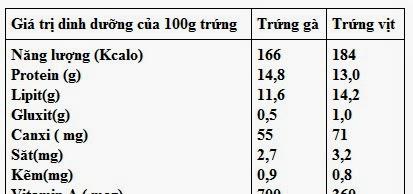Eggs are a great source of food for your baby's health, even when your baby is just starting to wean. However, not all mothers know all the nutritional value of eggs as well as the correct way to eat eggs. With MarryBaby refer to the following things offline!
Benefits from eggs
Not only high in protein, but also in eggs contains many vitamins and minerals that are very beneficial for the baby's development such as phosphorus, potassium, calcium, vitamin A, vitamin B ... Especially, the egg yolks contain lots of choline. An important nutrient for young brain development. Young brains in the age of 1-2 years develop quite quickly and if there is a lack of choline in this period, it will affect the production of nerve cells, causing intellectual impairment when growing up. In addition, the calcium and phosphorus in the eggs will help your baby's bones develop stronger.

The cholesterol content of duck eggs is twice as high as eggs
How to feed the baby eggs?
Mom should note the dose of eggs and age when feeding babies:
Children aged 6-7 months: The mother should only feed her baby half of the yolk at a time and should not feed her baby more than 2.3 times a week. Do not give your baby egg whites.
Children from 8 to 12 months old: Your baby can already eat one egg yolk at a time. But you should note that you should only feed your baby 3 or 4 times a week!
- Children younger than 1 year old can eat 3 to 4 eggs per week. Of course, your baby can eat both the yolks and egg whites now.
Children 2 years and older: If the baby likes, the mother can feed the baby eggs every day.

Nutrition for a healthy baby (p.1) Nutrition is one of the factors influencing a baby's development. What to feed the baby and how to eat is the very thing that mothers are very concerned about. The following nutritional basics will help mothers to have a more comprehensive view of the baby's nutrition to give a nutritional menu for the baby ...
Which eggs are good for your baby?
Duck eggs: The nutritional content in chicken eggs and duck eggs are relatively similar, but the micronutrients in eggs are still better than duck eggs. The vitamin A and zinc content of eggs is higher than duck eggs. In addition, eggs contain vitamin D while duck eggs are completely devoid of this vitamin. Eating duck eggs also causes more indigestion than eggs, so mothers should still give priority to baby eggs!
Quail eggs: Quail eggs may seem small, but the nutritional content in it is not less than eggs and duck eggs. Small quail eggs, very suitable for preschoolers. Moreover, the high content of phosphate fat in quail eggs stimulates the baby's brain development.
Some notes when feeding eggs

"Face point" habits affecting baby's health Did you know? There are habits that not only hinder your baby's healthy development, but also make them more susceptible to disease. Join MarryBaby to list a few habits that babies often have!
- Do not feed your baby raw eggs or dissolve raw eggs in hot foods, because bacteria in the eggs can persist and adversely affect the baby's digestive system.
- If you have a habit of feeding your child an omelette every morning, you should fry the eggs over low heat for a little while! Frying eggs over high heat will cause the whites to burn while the yolks are not fully cooked, which will lose many B vitamins and not destroy all the bacteria in the eggs.
- When boiling eggs, mothers should put eggs in from the beginning. Avoid letting boiling water to put eggs in because this will easily crack and lose nutrients.














